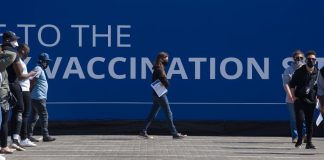
By Reuters

As deliveries of COVID-19 vaccines to Africa finally pick up, many nations are struggling with the logistics of accelerating their inoculation campaigns, the head of Africa’s disease control body said on Thursday.
Only 6.6 percent of Africa’s population of 1.2 billion is fully vaccinated, John Nkengasong, head of the Africa Centres for Disease Control and Prevention, told a virtual news conference. That means Africa is far from reaching the African Union’s aim of fully vaccinating 70 percent of people by the end of 2022, he added.
“What we are seeing now is a lot more vaccines coming in and the uptake is challenged because of the logistics and delivery,” said Nkengasong. “It’s not necessarily about hesitancy, it’s about moving vaccines from the airport to the arms (of people), it’s about logistics.”
He named the Democratic Republic of Congo and Cameroon as having particular logistical challenges but said many other African countries faced similar problems.
DR Congo has so far administered about 168,000 doses of COVID vaccines, a Reuters tracker showed, enough to have fully vaccinated just 0.1 percent of the population.
In April, authorities reallocated to other African countries most of the 1.7 million COVID-19 vaccine doses DR Congo had received a month earlier from the COVAX vaccine-sharing facility because they were set to expire.
Across Africa, authorities successfully conduct routine mass vaccination campaigns against diseases such as measles. But many struggled earlier in the year when COVID-19 doses arrived, citing shortages of funding, training, and cold storage.
Of some 403 million doses of COVID-19 vaccines distributed to 54 African countries, only 55% of them, or 221 million, have been administered.
South Africa has asked Johnson & Johnson and Pfizer to delay delivery of more COVID-19 vaccines because it now has too many in stock, as vaccine hesitancy slows its inoculation campaign, Reuters reported on Wednesday.